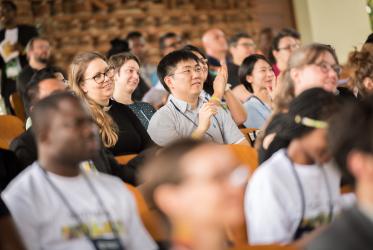Imagine a place where young Christians can gather, opening doors to interfaith reflection while working for justice and peace.
And situate that place in Cambodia, where people can see the issues of Cambodians through the eyes of the poor and an interfaith lens.
This is the Metta Karuna Reflection Centre in Siem Reap, Cambodia, founded and operated by Sister Denise Coghlan, an Australian sister working with the International Campaign to Ban Landmines. The campaign won the Nobel Peace Prize in 1997.
The centre provided a perfect venue for the World Council of Churches' (WCC) Youth in Asia Training for Religious Amity (YATRA) seminar, where some thirty participants representing 15 Asian countries are focusing on the theme “Together towards Justice and Peace: Walking the Talk in a Multi-Religious World.” They will continue their training until 21 June.
Coghlan works with the Jesuit Refugee Service, an international Catholic NGO, and she is known for her 25 years of work with refugees in Cambodia and with people with disabilities.
At the Metta Karuna Reflection Centre, Coghlan led the YATRA participants in a meditative walk through a pathway that traverses the campus. Called the “circle of peace,” the pathway was designed by Rob Allsop to display various symbols that reflect the spirit behind the work of the centre.
Among them is a sculpture, “I have no foot to wash,” which shows Jesus kneeling to wash the foot of a landmine victim; another sculpture of a woman at the well, giving away the “water of life”; earthen vessels perched together, signifying the dignity and human potential of each person; and a tree with red flowers, a reminder of the years of suffering and genocide endured by Cambodians during the Khmer Rouge regime.
Buildings in the Metta Karuna Reflection Centre are designed by architect Joaquin Salord, S.J., and built by Chan Rithy and the team. Metta means mercy, while Karuna means loving kindness in Pali, Coghlan explained.
The work of the centre includes holding seminars, as well as offering sanctuary and reflection days for people working on issues of forced displacement, interfaith dialogue, ecology, land rights, disability and disarmament. It grew from the work begun by the Jesuit Refugee Service in 1990 for rural development, reconciliation and people with disabilities, said Coghlan.
“I was quite pleased to hear that the World Council of Churches was coming,” she said. “Naturally we are interested in interfaith dialogue, as Christians are really small in number in Cambodia,” she added. Coghlan went on to say that the YATRA training can expose young Christian leaders to the social and political issues in Cambodia, teaching them how to work in countries where the predominant religious tradition is not Christianity.
Such training could “create increased sensitivity to interfaith dialogue,” she added.
Website of the Metta Karuna Reflection Centre
Young Christian leaders from Asia begin “YATRA” in Cambodia (WCC news release of 10 June 2014)
Cambodian landmine survivor shares his struggles for peace (WCC news release of 17 June 2014)
WCC programme for inter-religious dialogue and cooperation
Youth in the ecumenical movement
High resolution photos may be requested via photos.oikoumene.org






